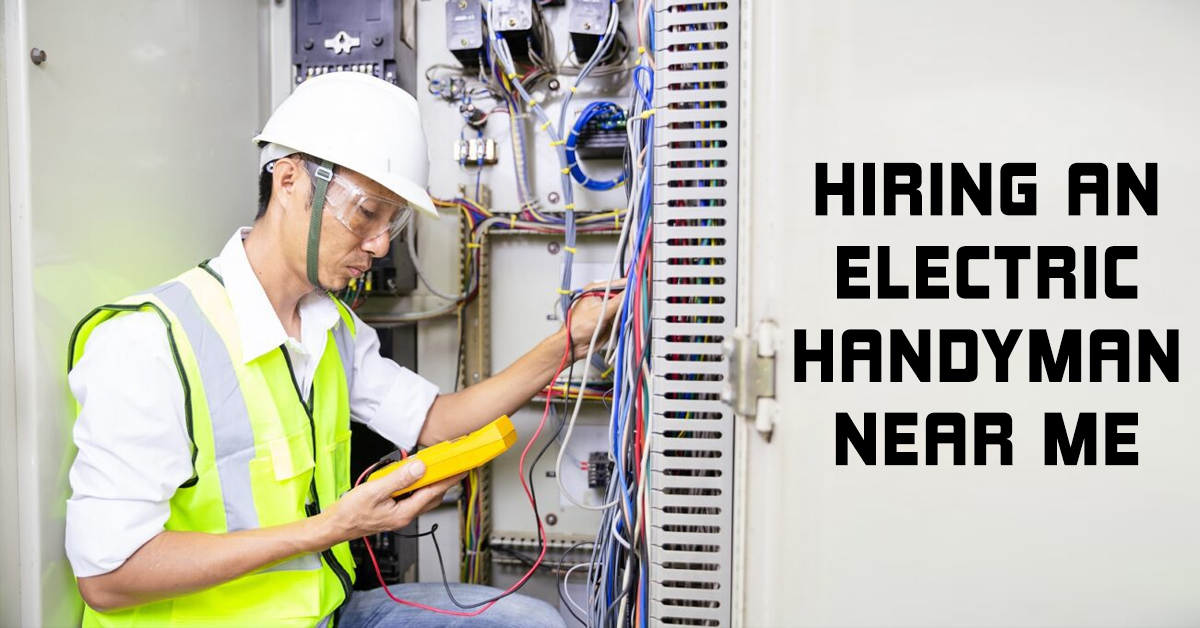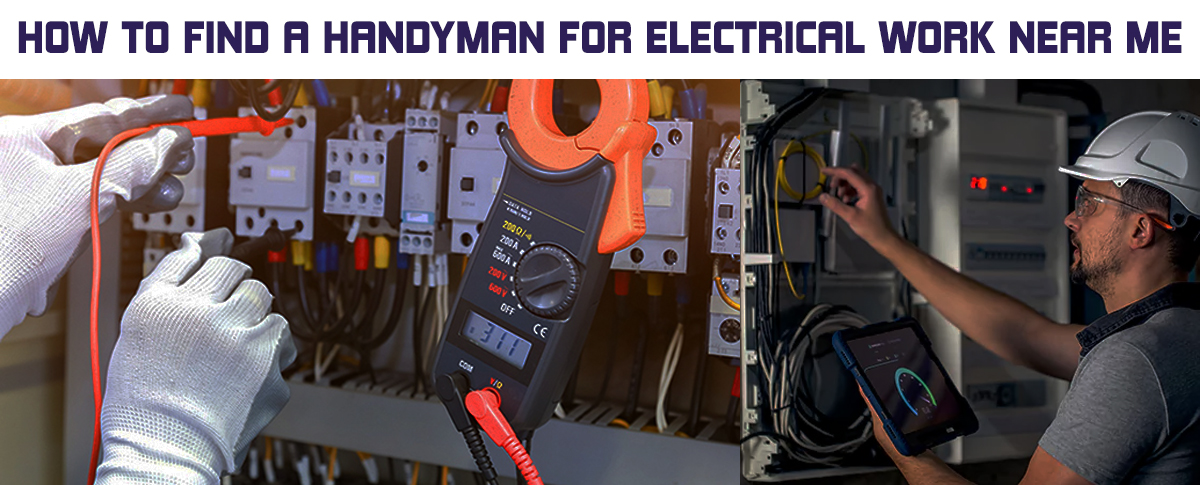Understanding Handyman Services: Scope and Limitations
Handyman services are often sought for their versatility in tackling a range of home repairs. It’s important to know when a handyman is suitable for a job, especially compared to a licensed electrician, and to understand the specific types of electrical tasks they can handle.

Differentiating Between Handyman and Licensed Electrician
A licensed electrician has undergone extensive training and certification to handle complex electrical systems. They are equipped to manage major electrical tasks like wiring, panel upgrades, and installations that require a deep understanding of safety codes and regulations. This expertise is crucial for ensuring that electrical work is done safely and effectively.
Handyman services, meanwhile, often include minor electrical tasks that don’t involve major wiring or alterations. These tasks might include replacing light fixtures, switches, or outlets. Handymen usually charge less per hour than electricians but may not have the same level of technical training. In some states, handymen can’t legally undertake certain electrical tasks without a license, so it’s important to check local regulations before hiring.
Identifying Services Offered by an Electrical Handyman
Electrical handyman services often focus on smaller repairs that don’t require in-depth knowledge or specialized equipment. These include tasks like installing ceiling fans, fixing broken lighting, and replacing electrical components like fuses or circuit breakers. For such tasks, a handyman can be a cost-effective choice, providing you with a quick and simple solution at a lower price.
Beyond electrical work, handymen might also offer other general home maintenance services such as painting, tile installation, and routine repairs. While handymen are useful for a variety of small jobs, always ensure that the tasks you need fit within their legal and practical scope. Proper vetting of their previous work and specific qualifications can help you determine their suitability for your project needs.
Checking Credentials and Insurance
Before hiring an electric handyman, confirming their licensing and insurance is key. Valid credentials ensure they are qualified and follow safety standards. Liability insurance protects against unforeseen damages or accidents.
Verifying Licensing and Certification
When choosing a handyman, ensure they hold a current license. This license shows they meet local and national electrical codes. Licensed electricians or handymen have passed exams and completed training. This background means they understand electrical systems and can manage installations or repairs safely.
Ask to see their license number and verify it through your state’s licensing board. This step assures you that the handyman is authorized to work and has not faced any major disciplinary actions. Use online databases to quickly verify this information, ensuring you’re hiring a trustworthy professional.
Understanding the Importance of Liability Insurance
Liability insurance is crucial when hiring an electrician. This type of insurance covers accidents or damage that might happen during a job. For instance, if something in your home is damaged, liability insurance helps cover the repair costs.
Ask for proof of insurance from your handyman or contractor. Make sure the policy is valid and covers all necessary aspects of the project. This step protects both your home and your finances. Having liability insurance offers peace of mind and ensures that unforeseen issues don’t become your burden. Always ensure this coverage before starting any handyman work in your home.
Safety Considerations for Electrical Tasks
Prioritize safety during electrical work by identifying common problems and seeking professional assistance to prevent hazards.
Recognizing Common Electrical Issues
Identifying common electrical problems early is crucial for maintaining safety and preventing accidents.
Signs of Electrical Problems:
- Flickering lights: May indicate loose connections or faulty wiring.
- Warm outlets or scorch marks: A sign of dangerous faults.
- Buzzing sounds: Could suggest issues with faulty wiring.
- Frequent circuit breaker trips: May result from overloaded or shorted circuits.
If you notice these issues, consult a professional electrician. Regular inspections can help detect and address problems early, ensuring safety in your home.
Preventing Electrical Fires Through Professional Help
Engaging a qualified electrician ensures safe installations and maintenance, reducing the risk of electrical fires.
Qualified Electricians
Professionals adhere to safety standards, ensuring proper installation and maintenance of electrical components.
Routine Maintenance
Regular checks by experts ensure wiring and connections remain safe, functional, and free of wear or fraying.
Modern System Upgrades
Electricians assess outdated systems to ensure they can handle current electrical loads safely.
Hiring professionals ensures your home’s electrical system is safe, reliable, and up-to-date, protecting against fire hazards.
Common Electrical Problems and Solutions
| Problem | Solution |
|---|---|
| Flickering Lights | Check for loose connections or consult an electrician. |
| Warm Outlets | Call a professional to address faulty wiring or components. |
| Buzzing Sounds | Have an electrician inspect and fix the wiring. |
| Frequent Breaker Trips | Evaluate circuit loads and replace faulty breakers. |
Planning Your Home Project With a Handyman
When planning a home project, working with a handyman can simplify the process, especially for electrical jobs. It’s important to know your needs and budget to make informed decisions. This involves assessing the type of work required and understanding handyman rates.
Assessing Your Electrical Needs
Start by figuring out the specific electrical tasks necessary for your home project. Common projects may include updating your electrical panel, rewiring, or replacing light fixtures. You should consider what electrical work is essential and whether it involves major installations, like ceiling fans or new outlets.
Check current systems before starting work. This ensures your electrical plan fits into existing structures. This step is crucial when deciding whether any upgrades or new installations are needed.
Understand the local regulations regarding electrical work. Some tasks might require a licensed electrician, and it’s important to consult with your handyman to clarify what they can legally perform.
Budgeting for Electrical Work and Handyman Rates
Once you understand your needs, planning your budget comes next. Handyman rates for electrical work typically range from $50 to $100 per hour, depending on both the project and your location. You should discuss these rates beforehand to avoid unexpected expenses.
Create a detailed list of tasks and get estimates for each. This can include replacing light switches or installing additional electrical outlets. Comparing these estimates can help you identify the best option within your budget.
It’s wise to set aside funds for unforeseen complications that could arise during your project. Always keep extra funds to handle unexpected issues. This helps to keep your project on track, ensuring you stay within your financial plan.
Finding the Right Professional
Finding the right professional for your electrical handyman needs can make a big difference in the success of your home projects. Knowing how to use online tools and check reviews can help you find skilled workers in your area.
Utilizing Online Resources to Hire Local Pros
When looking for local professionals, using websites like HomeAdvisor or Yelp can be a big help. These platforms list various handymen and provide information about their services. You can compare prices, check availability, and see what specific skills each pro offers. Online directories can also highlight their experience and past projects, ensuring that you find someone who fits your needs.
Look for electricians who keep their profiles up-to-date with certifications and reviews. Many websites allow you to see ratings from past clients, which can help you decide if a handyman meets your quality standards. A clear and detailed profile often shows professionalism, making your decision easier.
Evaluating References and Reviews
Checking references and reviews is crucial when selecting an electrician. You want to ensure they have a strong history of satisfied customers. Contacting previous clients can provide insight into their reliability, punctuality, and quality of work. Online reviews can show patterns in performance, highlighting both strengths and potential weaknesses.
Pay attention to how handymen respond to feedback online. Professionals who address concerns professionally and aim to rectify issues often care about customer satisfaction. Positive reviews and recommendations from friends or family can further guide your choice, helping you hire someone trustworthy.
Frequently Asked Questions
When hiring an electrician for small jobs in your home, there are several key points to consider. These include checking qualifications, verifying licenses, understanding cost factors, and confirming the reputation of the electrician.
What qualifications should I check for when choosing a local electrician for small jobs?
Look for certifications or formal training in electrical work. Electricians should have experience relevant to your specific job needs. Check if they have completed any apprenticeships or have recognition from industry bodies.
How do I ensure that an electrician is properly licensed for residential work?
Ask to see their state or local licenses. These licenses show they have met the required standards to perform electrical work safely. You can also check with local regulatory websites to verify their license status.
What are the average costs associated with hiring an electrician for household tasks?
Typically, electrician costs can range from $50 to $100 per hour. Prices can vary based on the job’s complexity and location. Some projects might have a flat fee, averaging around $300, depending on the specifics of the work.
How can I save money while ensuring quality electrical work when hiring a professional?
Get estimates from multiple electricians to compare rates. Prioritize tasks to avoid unnecessary work and accept bids that reflect both skill and fair pricing. Ensure all work adheres to safety standards to reduce future costs.
What is the difference between hiring a handyman with electrical skills and a licensed electrician?
A licensed electrician has formal education and state certifications, suitable for complex electrical tasks. A handyman may handle minor repairs but may lack specific qualifications for detailed electrical work.
How can I verify the reputation and reliability of an electrician or electrical handyman before hiring?
Request references from previous clients and check online reviews. Look for consistent praise for reliability and skill. You can also consult professional associations where the electrician might be a member.



